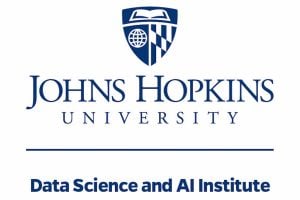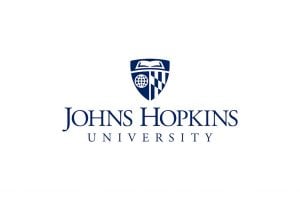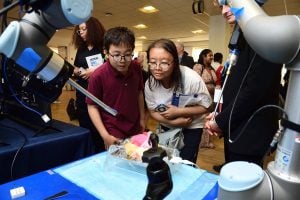
Last year, four multidisciplinary research teams received seed funding from the Johns Hopkins Data Science and AI Institute and the Office of the Dean of the Krieger School of Arts and Sciences to pursue research using AI and data science to address a broad range of societal and humanitarian challenges related to topics from archaeology to the environment. The DSAI seed funding began in 2023 with the intent to broaden the deployment of AI to every corner of the University, with a concentration in the humanities, arts, physical and social sciences.
“This year’s winners again reflect the great breadth of AI-aided research underway across the whole Hopkins diaspora. They are clear beacons of the power of AI to aid analysis and broaden scope to a previously unattainable degree, which is shown in its best light when coupled to human creativity and critical thinking,” says Paulette Clancy, the Data Science and AI Institute’s director of research for discovery and inquiry.
Benjamin Zaitchik , the Morton K. Blaustein chair and professor in the Department of Earth and Planetary Sciences, received funding for his project, “A Machine Learning Framework for Clustering a Global Flash Drought Event Dataset.” This research focuses on analyzing approximately 1.8 million flash drought events using ERA5 reanalysis, a fifth-generation tool that provides estimates of a range of climate variables from January 1940 to the present.
, the Morton K. Blaustein chair and professor in the Department of Earth and Planetary Sciences, received funding for his project, “A Machine Learning Framework for Clustering a Global Flash Drought Event Dataset.” This research focuses on analyzing approximately 1.8 million flash drought events using ERA5 reanalysis, a fifth-generation tool that provides estimates of a range of climate variables from January 1940 to the present.
Flash droughts—droughts that emerge and intensify within weeks—are an increasingly recognized hazard for agricultural, water resources, and ecosystems, explains Zaitchik. Zaitchik is using the funding to develop a global typology, a comprehensive, function-based classification system for Earth’s ecosystems that will allow for more accurate predictions of flash floods.
“One unexpected result of the AI-informed flash drought classification is that we have not found systematic differences between climate zones. We had expected to find that drought initiation processes in the tropics, for example, might be easily distinguishable from initiation processes at higher latitudes. Instead, our initial results suggest that classes of flash drought can span diverse climate zones,” he says. “These results, though still preliminary, suggest that predictive characteristics of flash droughts might differ more by weather context than by climate zone: i.e., similar sets of precursor conditions might be found in diverse parts of the globe. If confirmed, this will influence our approach to designing generalizable flash drought forecast systems.”
Anqi Liu
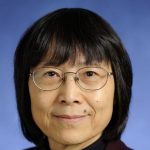 , an assistant professor in the Department of Computer Science, and Lingxin Hao, the Benjamin H. Griswold III Professorin Public Policy, are using their Seed Grant to pursue “Sociological Foundations of Learning with AI” research, focused on exploring the social and behavioral impacts on students of their use of AI in a learning setting. This interdisciplinary project involves faculty from computer science, sociology, and education. “We provide a sociological, behavioral, ethical, and computational perspective to this question,” Liu says. “We need to study AI in education carefully so that we can redesign algorithmic and interactive interfaces to ensure that AI benefits students’ learning.”
, an assistant professor in the Department of Computer Science, and Lingxin Hao, the Benjamin H. Griswold III Professorin Public Policy, are using their Seed Grant to pursue “Sociological Foundations of Learning with AI” research, focused on exploring the social and behavioral impacts on students of their use of AI in a learning setting. This interdisciplinary project involves faculty from computer science, sociology, and education. “We provide a sociological, behavioral, ethical, and computational perspective to this question,” Liu says. “We need to study AI in education carefully so that we can redesign algorithmic and interactive interfaces to ensure that AI benefits students’ learning.”
Their findings will inform the design of AI tools that facilitate student learning and provide a deeper understanding of how teaching and pedagogy should evolve as AI ‘s role in education grows. “When using ChatGPT for learning purposes, one should take charge of active learning,” says Hao. “Without knowing what you need to learn and breaking down a complex problem in steps, ChatGPT can hurt learning outcomes.”
Liu and Hao presented their research at the Association for the Advancement of Artificial Intelligence and the Association for Computing Machinery’s conference on Artificial Intelligence, Ethics, and Society meeting in Madrid, Spain, October 20 to 22, 2025.

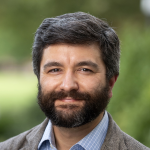 A unique DSAI Seed Grant project is being led by Michael Harrower, a professor of archaeology in the Department of Near Eastern Studies, and Tom Lippincott, an associate research professor in the Department of Computer Science. Archaeology provides the cross-cultural perspective and time depth needed to understand the long-term trajectories of human societies, explains Lippincott, adding that archaeological sites and artifacts are rapidly disappearing.
A unique DSAI Seed Grant project is being led by Michael Harrower, a professor of archaeology in the Department of Near Eastern Studies, and Tom Lippincott, an associate research professor in the Department of Computer Science. Archaeology provides the cross-cultural perspective and time depth needed to understand the long-term trajectories of human societies, explains Lippincott, adding that archaeological sites and artifacts are rapidly disappearing.
Their research applies computer vision and deep learning to archeology, specifically to identify, document, and interpret archaeological remains in Afar, Ethiopia. “These innovations not only preserve irreplaceable evidence but also transform how we study and visualize humanity’s shared history,” says Harrower.
The funding has allowed Harrower and Lippincott to foster collaboration between students and scholars across archeology and computer science that would otherwise have been unlikely to take place. Harrower says that the field of digital archaeological discovery is rapidly evolving. “This work exemplifies how data science and archaeology together can deepen our understanding of the human experience while safeguarding its material legacy,” says Harrower.

 A DSAI Seed Grant project looking to the future of battery power is being led by Sara Thoi, an associate professor in the Department of Chemistry, and Brandon Bukowski, an assistant professor in the Department of Chemical and Biomolecular Engineering. With additional support from JHU’s Ralph O’Connor Sustainable Energy Institute, they have developed tools to study lithium polysulfide aggregation, a phenomenon responsible for battery cell failures at low temperatures. Lithium-sulfur batteries are promising energy storage devices with nearly 10 times the energy density of common lithium-ion batteries. However, “they do not perform as well at low temperatures due to internal resistance and poor ionic mobility,” says Thoi.
A DSAI Seed Grant project looking to the future of battery power is being led by Sara Thoi, an associate professor in the Department of Chemistry, and Brandon Bukowski, an assistant professor in the Department of Chemical and Biomolecular Engineering. With additional support from JHU’s Ralph O’Connor Sustainable Energy Institute, they have developed tools to study lithium polysulfide aggregation, a phenomenon responsible for battery cell failures at low temperatures. Lithium-sulfur batteries are promising energy storage devices with nearly 10 times the energy density of common lithium-ion batteries. However, “they do not perform as well at low temperatures due to internal resistance and poor ionic mobility,” says Thoi.
With support from the DSAI Seed Grant, Thoi and Bukowski are collaborating to use AI and machine learning tools to understand the fundamental chemistry that limits lithium-sulfur battery performance. The research team, including two students, has combined physical experiments with computational tools to understand how lithium polysulfides aggregate and how to design electrolytes that prevent their formation. Thoi and Bukowski plan to submit a joint external grant proposal to advance this work.
Learn more about the Data Science and AI Institute’s Seed Grant Program.
